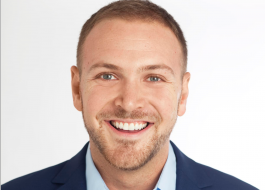
There's nothing like trying to find your first job. Whether you've just left university or you're searching straight from high school, it can feel like you're sending your CV into the void.
You might start feeling like it's pointless going up against so many people who have a lot more experience than you, and it may seem like you'll never get your foot in the door.
However, it's probably not as bad as you think. Ed Mitzen, founder of marketing company Fingerpaint, has been in the advertising world for a little over 20 years. Over that time he has hired over 1,000 people, many of them recent graduates.
Business Insider asked him what recent graduates or students who are job-hunting for the first time need to know.
Here are his top 10 pieces of advice:
1. Don't stress out about how much time it takes.
Mitzen has three kids, two of whom are nearly finished college. He tells them they have 40 years of work ahead of them, maybe more, so there's no point stressing out if it takes you a few months to find a job once you graduate.
"A lot of these kids who I interview, they [act] like it's life or death if they don't get a job a month after graduating," Mitzen told Business Insider. "I try to tell them that you're going to have plenty of time to work, so just give yourself a little bit of a break, and don't get too stressed out in the process."
2. Know that rejection is part of the game.
Don't get too frustrated with rejection. Mitzen said it's just part of the game. Job applications and interviews take practise just like anything else, and it can take a while to get it right. So don't get stressed out if the first few interviews don't go swimmingly.
3. Focus on the industry, not the job.
Chances are, you're probably not going to be offered your dream job straight out of school — and that's fine. Mitzen says although it can be tempting to go for a role at the level you think you deserve, you should probably focus on getting an entry level position in an industry you really want to get into.
"You're much better off trying to get into an industry that you have some interest in, even if it's not the ideal job you were hoping for," he said. "I tell young graduates that if you want to be in advertising and an advertising agency in New York offers you a job answering the phones, take it. Anything that gets your foot in the door."
This way, you can get to know people, figure out what opportunities might be coming up, and show those higher up that you're passionate about the field.
4. Don't let money be the focus too early on.
It's hard to forget those student loans you're probably dragging along. If you're an overseas student, or you study in America, your fee may have been astronomical. This means it can be tempting to go for any job that seems to pay pretty well, or gives you lots of hours, like bartending.
However, Mitzen says you have to get into the industry you want to sooner or later, so doing this is just delaying the inevitable.
"Eventually you're going to have to take an entry level position somewhere, to begin your sort-of-real career," he said. "And if you need money, or if that's more of a driving force, then maybe bartend at night or on the weekends."
5. Do your research.
One big mistake recent graduates make in interviews is not doing enough research on the company, Mitzen says. It's pretty obvious whether someone's done their homework, because they'll ask pointed questions.
"They should at least know what we do, they should read up on some of our current happenings, or clients that we want, or press releases that have gone out, or relevant industry news," Mitzen said. "They should at least have some basic understanding of what it is we do and the types of people we're looking for, and what's new in our world."
 Columbia Pictures
Columbia Pictures
6. Don't ask about salary/ holiday/ benefits too early.
Another error is when interviewees ask about the benefits of the job too early on. Mitzen says that sometimes candidates ask about these things in the first interview, and it sends a "really poor message."
"You have to be offered the job first before you really have a right to start talking about that stuff," he said. "It doesn't really show a real desire to come in and work really hard."
7. Be positive and confident.
Mitzen looks out for candidates who are high energy, are they looking him in the eye when they shake his hand, and appear confident.
"I was 22 years old at one point, so I know that they're nervous and it's uncomfortable," Mitzen said. "But can they get through that to show that they're really excited to be there, and really engaged and present?"
Don't take it so far that you're cocky, but you should at least show that you're excited about the opportunity. This is especially important in advertising, Mitzen says, because it's like a team sport and you work in a collaborative environment.
"We need them to have this air of positivity about them," he said. "If people come in and they look nervous, and they're quiet or they're not smiling, or they appear really reserved, it's challenging. You want somebody who's high energy, and looks like they're going to be excited to be there."
7. Remember the interviewer is rooting for you.
When you've got to the interview stage, that means the employer thinks they might want to hire you. They're looking for someone who's going to be a good fit in the company, is intelligent, and shows initiative. They're rooting for you, and they probably won't want to try and trip you up.
Of course, there will be tricky questions, but just be honest if you can't answer them, or you need some clarification.
"We're not trying to trip people up or put them in a really high stress situation and hope that they bomb," Mitzen said. "We want people to do well, and if you make a mistake, you laugh it off and you ask if that answers the question and try to move on."
8. Recognise that you're not experienced, but that's fine.
"I assume that when you're coming out of university, and you're new to the job market, for the most part you're not really qualified to do anything," Mitzen said. "Nobody is. I wasn't either."
Rather than worrying about how qualified or experienced the other candidates are, focus on what you can bring to the role. Mitzen says he's more interested in getting to know you as a person — whether you're hard working, friendly, or have some unusual interests and skills.
"I always think it's great if you can put on your resume things that are a little bit unique, like if you can juggle, or if you know how to do sign language," he said.
This actually worked for Mitzen's daughter. She got a job teaching kids because the employer liked the fact she would be able to teach them juggling.
9. Make the most of your connections.
Mitzen says he tells graduates all the time not to be afraid of taking advantage of personal connections. His company is only a few hundred people in size, but he gets five to ten resumes a day, and it can be hard to differentiate between them unless one really stands out.
"If we have a personal reference or recommendation from someone, that can make a difference, at least in terms of getting you through the door," Mitzen said. "I think kids are nervous to take advantage of people that they know or that their families know, because they feel like it's cheating, and they need to be able to do it on their own."
At the very least, it will probably get you into a quick interview or coffee meeting with someone at the company.
10. Show you want it.
Mitzen says he likes candidates to show passion by following up with a handwritten note thanking him for the opportunity to interview.
"I just think going that little bit of an extra mile matters," he said. "I think people can show how passionate and excited they are about the opportunity — those are the people that we want."




